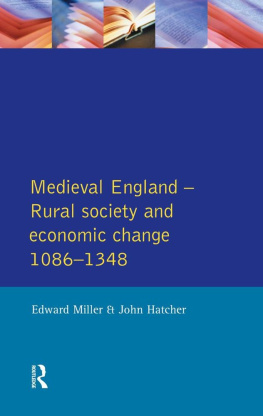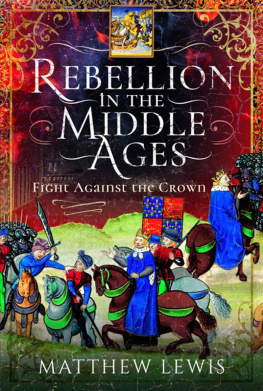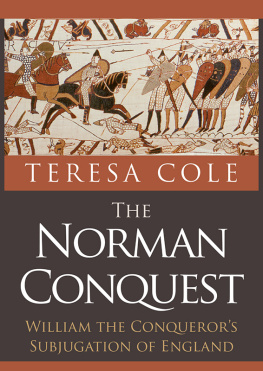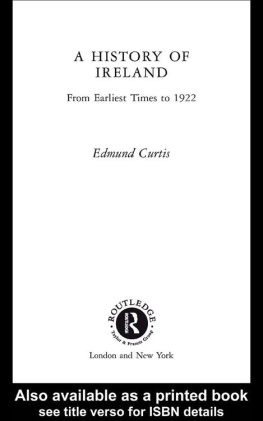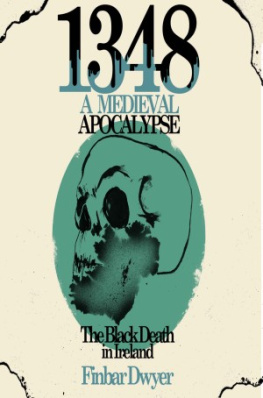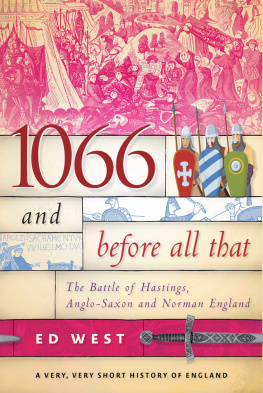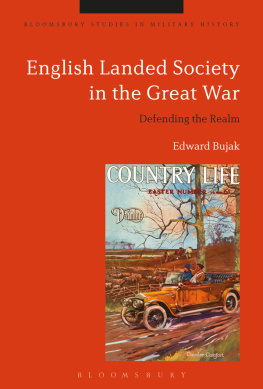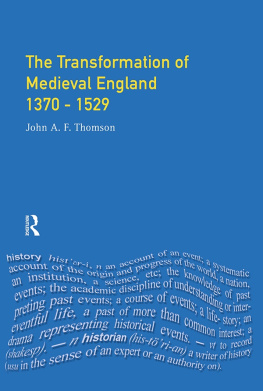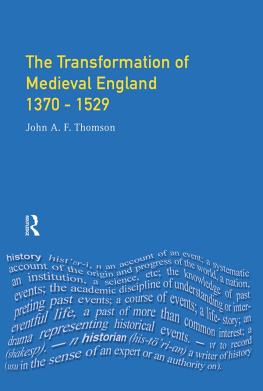Social and economic history of England
edited by Asa Briggs
Medieval England Rural society and economic change 10861348
Edward Miller
Master of Fitzwilliam College, Cambridge and
John Hatcher
University Lecturer in History and Fellow of Corpus Christi College, Cambridge

First published 1978 by
Longman Group Limited
Published 2014 by Routledge
2 Park Square, Milton Park, Abingdon, Oxon OX14 4RN
711 Third Avenue, New York, NY, 10017, USA
Routledge is an imprint of the Taylor & Francis Group, an informa business
Longman Group Limited 1978
All rights reserved. No part of this publication may be reproduced, stored in a retrieval system, or transmitted in any form or by any means, electronic, mechanical, photocopying, recording, or otherwise, without the prior permission of the Copyright owner.
Library of Congress Cataloging in Publication Data
Miller, Edward, 1915
Medieval England.
(Social and economic history of England)
Bibliography: p. 275
1. EnglandSocial conditions. 2. EnglandSocial life and customsMedieval period, 10661485. 3. EnglandEconomic conditions. I. Hatcher, John, joint author. II. Title. III. Series.
HN386.A8M54 1978 309.14202 77-21445
ISBN 13: 978-0-582-48547-1 (pbk)
Type photoset in 10 point Times by Woolaston Parker Ltd, Leicester
Contents
(As used in Notes and Bibliography)
Agric. Hist. | Agricultural History |
Agric. Hist. Rev. | Agricultural History Review |
B.L. | British Library (formerly the British Museum) |
Bishop Swinfields Household Book | Roll of the Household Expenses of Richard de Swinfield |
Brit. Acad. Rec. Soc. Econ. Hist. | British Academy Records of Social and Economic History |
C.R. | Court Rolls |
Cart. Osen. | Cartulary of Oseney Priory, ed. H. E. Salter |
D.B. | Domesday Book seu Liber Censualis |
Danelaw Documents | Documents Illustrative of the Social and Economic History of the Danelaw |
E.H.R. | English Historical Review |
Econ. H.R. | Economic History Review |
Eng. Hist. Docs | English Historical Documents |
Feudal Aids | Inquisitions and Assessments Relating to Feudal Aids |
Guisborough Chartulary | Cartularium Prioratus de Gyseburne |
J. Econ. Hist. | Journal of Economic History. |
P. and P. | Past and Present |
P.R.O. | Public Record Office |
P.R.O. Chancery Inq. p.m. | Public Record Office, Chancery Inquisitiones post mortem |
Proc. Brit. Acad. Regesta | Proceedings of the British Academy Regesta Regum Anglo-Normannorum |
Rot. Hundr. Sussex Custumals | Rotuli Hundredorum Custumals of the Sussex Manors of the Archbishop of Canterbury |
T.R.H.S. | Transactions of the Royal Historical Society |
U.P. | University Press |
V.C.H. | Victoria County History |
In the writing of this book we have had to face certain difficulties and have accumulated many obligations. To take the difficulties first, recent years have seen radical changes in local government boundaries and in our currency. We have none the less felt it appropriate, in a study of the medieval countryside, to attribute places to the historic counties or other districts in which they then lay. Sums of money have also been expressed in medieval terms, in which twelve pennies made a shilling, twenty shillings a pound, and thirteen shillings and fourpence a mark. As to obligations, we have listed in the notes and bibliography the works of many scholars on whose labours we have heavily drawn, although even since this book went to press others have appeared we regret came too late for us to use. Miss Barbara Harveys magisterial study of the Westminster Abbey estates is a salient example. Some obligations call for more explicit acknowledgement. We are grateful to the Economic History Review for permission to reproduce the statistics from articles by D. L. Farmer published in the Economic History Review, 2nd series, 9(1956), (1957) and (1969); to Mrs Gillian Baker, Miss Brenda Magurran and Mrs Audrey Stone for turning so many untidy drafts into acceptable copy; and to Dr E. J. King for reading an early draft of the whole work and making many helpful suggestions. Finally, we wish to record a special indebtedness, extending over many years, to Professor M. M. Postan. No-one in our generation has done so much to enlarge our understanding of the medieval English countryside, and we are fortunate in being among the beneficiaries of his work. At the same time, of course, responsibility for our conclusions is solely our own.
E. M.
J. H.
Cover photographs:
Ripon Cathedral (Aerofilms Ltd.). Addit Ms 28162 and Royal Ms 2B vii f. 78V (both from the British Library).
Many problems face the student who seeks to understand a society different in time and structure from his own, and for the student seeking to understand medieval society these problems are magnified by the inadequacies of the surviving sources. Apart from the fact that, with the passage of time, many have simply perished, the period known as the Middle Ages was one of restricted literacy when many things that we would record in writing were a matter of oral transactions that have left no record for remote generations. What happened, therefore, is frequently in doubt, so that it is hardly surprising that why or how it happened should be the subject of lively controversy. This does not mean, however, that we should abandon the effort to discover what happened and why and how; and generations of scholars have done a very great deal to provide answers, even though some of them are debatable, to precisely these questions. It is the object of this study to introduce the reader to some of the fruits of their labours.
At the same time, precisely because the medieval environment is an unfamiliar one, it may prove useful to pass in review certain features of medieval life that provide the starkest contrasts to life in our own times. To begin with there was the very precariousness of life, deriving above all from mans dependence on the weather and his vulnerability to disease. Most of the inhabitants of the medieval west were small-scale peasant farmers equipped only with a backward technology and mainly dependent for their daily consumption upon their own fields and livestock. The quality and quantity of the harvest, therefore, was always of paramount consequence to them; the harvest was largely determined by the vagaries of the weather; and its yield in turn was also a major influence on levels of employment and activity in sections of the economy far removed from agriculture. A poor harvest meant less to eat and less to sell for the peasant household; a really bad harvest might compel many peasant households to buy food in order to survive, to starve their livestock of fodder, even to slaughter some animals. At the same time meagre yields meant high prices, so that all those who had to buy food had less income over for the purchase of manufactured articles and non-essential products. Consequently excessive cold, drought, high winds and, worst of all, wet summers adversely affected labourers, craftsmen, merchants as well as peasant farmers; and a succession of harvest failures might provoke a crisis which embraced all branches of the economy.
Next page
